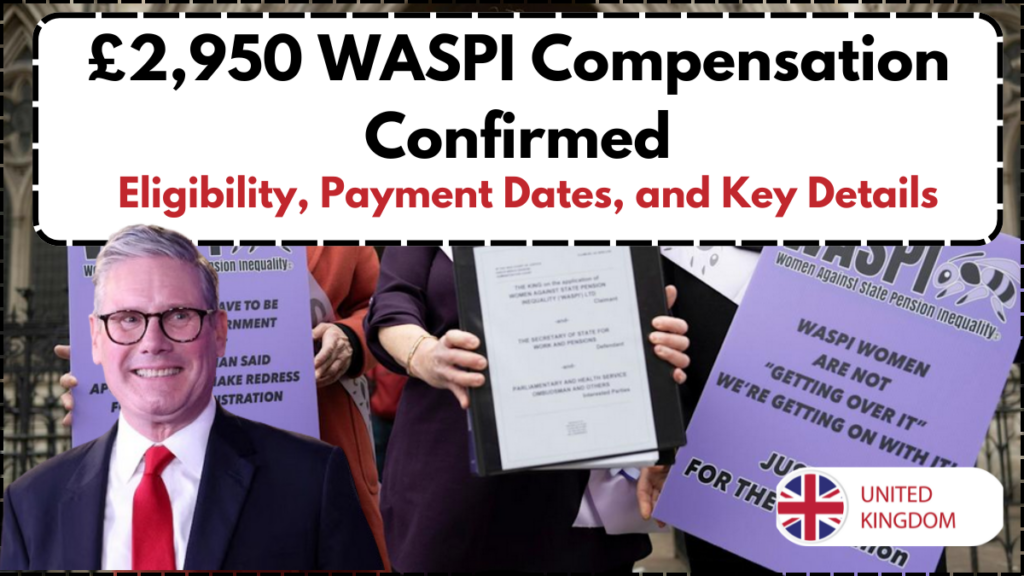Thousands of women across the United Kingdom are still experiencing the financial and emotional repercussions of unexpected state pension age changes. These abrupt policy adjustments, made with little to no formal warning, placed an immense burden on many women born in the 1950s and early 1960s. As of April 2025, these women may be eligible for compensation of up to £2,950 from the Department for Work and Pensions (DWP), a result of tireless campaigning by Women Against State Pension Inequality (WASPI).
Although the compensation offer has been acknowledged as a positive step, debate continues regarding whether the amount adequately addresses the extent of the harm caused. Below, we explore the background, current status, and the criteria for claiming this financial support.

Understanding the £2,950 WASPI Compensation Scheme
The £2,950 payment represents the upper limit recommended by the Parliamentary and Health Service Ombudsman (PHSO) following its investigation into the DWP’s handling of state pension age changes. The core issue lies not in the equalisation of pension ages between men and women but in the lack of timely and adequate communication regarding these changes.
Women affected were often unaware of the revised retirement age—from 60 to 66—until it was too late to make meaningful adjustments to their financial plans. The Ombudsman found that the DWP failed to meet its obligation to provide sufficient notice, which had significant financial and emotional consequences.
Detailed Overview: WASPI Compensation 2025
| Key Aspect | Details |
|---|---|
| Compensation Amount | Up to £2,950 (Ombudsman recommendation) |
| Eligibility | Women born between 1950 and 1960 |
| Reason for Payment | Inadequate notice of pension age changes by the DWP |
| WASPI’s Compensation Ask | £10,000 per woman |
| Ombudsman’s Proposed Range | £1,000 to £2,950 based on individual impact |
| Status as of April 2025 | Ongoing parliamentary discussions, no final decision |
| More Information | Visit www.waspi.co.uk |
The WASPI Campaign: Advocacy Rooted in Fairness
WASPI was formed to address the injustice faced by women affected by the rapid changes in pension age policies. While accepting the principle of pension age equalisation, the campaign highlights the government’s failure to communicate these significant changes in a timely manner.
Women who had planned for retirement at 60 suddenly found themselves required to work several more years, often without the financial resources to bridge the unexpected gap. Many were forced to draw on personal savings or rely on welfare support, leading to increased financial pressure and emotional distress.
Timeline of UK Pension Age Reforms
Understanding the evolution of pension age policies is essential to grasp the depth of this issue:
- 1940s: Retirement age set at 60 for women, 65 for men
- 1995: Legislation passed to gradually increase women’s pension age to 65 by 2020
- 2011: Changes accelerated to bring parity by 2018
- 2020: Both genders required to retire at 66
- By 2028: Pension age to increase to 67
- 2044 to 2046: Further increase to 68 anticipated
Many women born in the 1950s received little to no notice of these changes, leaving them unprepared for the financial consequences.
Who Can Apply for WASPI Compensation in 2025?
You may be eligible for this compensation if:
- You were born between 1950 and 1960
- You experienced financial hardship due to the increased retirement age
- You did not receive sufficient notice from the DWP about the changes
The PHSO concluded that a minimum 28-month notice period should have been provided. However, a significant number of women either received much shorter notice or were not informed at all, severely impacting their ability to plan their retirement.
Key Findings from the Ombudsman’s Report
The Parliamentary and Health Service Ombudsman’s investigation revealed the following:
- The DWP failed to deliver clear, timely notifications
- Many affected women had little opportunity to adapt financially
- The lack of notice caused measurable emotional and mental stress
These findings led to the recommended compensation tier of £1,000 to £2,950, depending on the severity of the impact on each individual.
WASPI’s Push for Greater Compensation
WASPI maintains that the proposed amount falls significantly short. The group is advocating for £10,000 per eligible woman, based on the following arguments:
- Women lost years of pension income they were entitled to expect
- Many had to postpone retirement or retire into poverty
- Emotional damage from the sudden changes was substantial
Several Members of Parliament have voiced support for WASPI’s position, and public pressure continues to mount.
Current Government Response and Future Outlook
As of April 2025, the UK government has yet to finalize any official compensation scheme. Discussions are active in Parliament, with many campaigners and MPs pushing for a more comprehensive settlement.
Affected women are advised to monitor updates via the official WASPI website and remain engaged in the ongoing dialogue. It is anticipated that increased political and public scrutiny may influence the eventual outcome.
Conclusion
The WASPI campaign has shone a critical spotlight on the real-life impact of pension reform mismanagement. While the £2,950 compensation proposal marks a turning point, the quest for justice remains incomplete. With continued advocacy and growing political support, there is hope that the final resolution will reflect the seriousness of the hardship endured by thousands of women across the UK.
FAQs
What is the current maximum WASPI compensation proposed in 2025?
The Parliamentary and Health Service Ombudsman has recommended a maximum payment of £2,950 per eligible woman, depending on the level of individual impact.
Who qualifies for the WASPI compensation?
Women born between 1950 and 1960 who did not receive adequate notice about state pension age changes and suffered financial or emotional hardship as a result.
Has the UK government confirmed the compensation?
No. As of April 2025, no final decision has been made. The matter is still under parliamentary review.
What does WASPI want in compensation?
WASPI is calling for £10,000 per woman, arguing that the current proposal does not fully compensate for the losses experienced.
Where can I find more information?
You can stay informed by visiting the official WASPI website at www.waspi.co.uk
For More Information Click Here
Pari is a passionate writer known for captivating stories that blend imagination and reality. Inspired by travel, history, and everyday moments, Pari crafts narratives that resonate deeply with readers.




